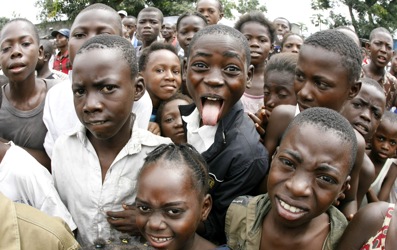From unresolved legacies of trade and trafficking to heavier policing, children of African descent continue to be discriminated against, sometimes to the extent that they are no longer considered children, a report by the Working Group on people of African descent showed.
Children of African descent face discrimination throughout the diaspora and in various areas of life, from education and health systems, to — most notably — the administration of justice and law enforcement, a report issued on Tuesday.
“Due to racial discrimination, racial stereotypes, systemic racial discrimination and xenophobia, children of African descent are not considered as children at all,” Catherine Namakula, the Working Group Chair, said. This is especially true in the eyes of the law, the experts stressed.
False racial stereotypes driving law enforcement
Experts found that these young people face heavier policing, including more arrests, police surveillance, racial profiling, strip searches and excessive use of force. In short, “law enforcement is in conflict with children of African descent,” according to the report.
They also noted that this was driven by false racial stereotypes of criminality, culpability and dangerousness, which influence decision-making, including by police officers, prosecutors, lawyers and judges globally.
In the report, they stressed that urgent action is needed globally to end excessive use of force, extra-judicial killings, disparities, racial profiling and stereotypes, systemic racial discrimination, hate speech and hate crimes and that a racial justice index is needed to measure progress.
Belgium, specifically, has been slapped on the wrists by a UN committee for the fact that racial profiling by police continued to be a persistent problem in the country and the allegations of deaths in custody and of abuses inflicted on members of ethnic minorities, migrants, or asylum seekers.
Figures from earlier this year showed that, in Brussels in particular, the number of complaints and judicial reports alleging racism and/or discrimination increased.
“We must dismantle discriminatory structures and create political space for a dialogue on reparations at the international, regional, national and local levels. Only the truth, accountability and justice can eliminate racial discrimination,” said Namakula.
Changing narrative
Aside from systematically changing the structure of the public sphere, the experts highlighted the overall need to change the narrative around children of African descent, and in doing so, called out the UN and other stakeholders to stop using images of these children in undignified circumstances for marketing and fundraising purposes.
They further urged these organisations to address negative stereotypes, adding that “children of African descent are not synonymous with poverty."
“Leaving no child behind requires bringing the issues of children of African descent from the margins to the mainstream in education, health, social services and child justice. Humanity owes the best it has to give to every child without exception,” Namakula said.

